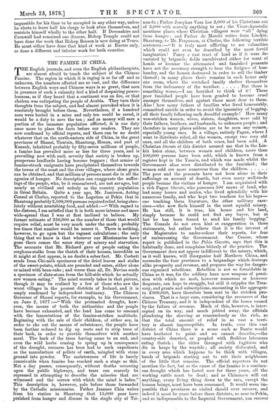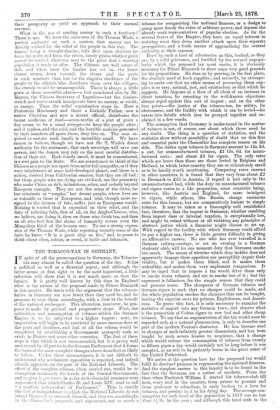THE FAMINE IN CHINA.
'rEnglish journals, and even the English philanthropists, are almost afraid to touch the subject of the Chinese Famine. The region in which it is raging is so far off and so unknown, the numbers affected are so vast, and the difference between English ways and Chinese ways is so great, that men in presence of such a calamity feel a kind of despairing power- lessness, as if they heard that a continent was on fire, or that cholera was extirpating the people of Arabia. They turn their thoughts from the subject, and feel almost provoked when it is resolutely brought before them. Nevertheless, if a hundred men were buried in a mine and only ten could be saved, it would be a duty to save the ten ; and as money will save a portion of the immense population afflicted, it is our duty once more to place the facts before our readers. They are now confirmed by official reports, and there can be no doubt whatever that on the north-eastern side of China, in the great provinces of Shansi, Tientsin, Shantung, Honan, and part of Kansuh, inhabited probably by fifty-seven millions of people, a famine has prevailed more or less for three years, and is prevailing now with such severity that society is broken up, prosperous landlords having become beggars ; that armies of famine-struck emigrants have precipitated themselves towards the towns of the coast and the river villages, where alone grain can be obtained, and that millions of persons must die in all the agonies of hunger. No description can exaggerate the suffer- ings of the people, who, be it remembered, are not savages, but nearly as civilised and orderly as the country population in Great Britain. Quite a year ago, Mr. Jamieson, Acting Consul at Chefoo, reported to the Legation at Pekin that in Shantung probably 2,500,000 persons required relief, being abso- lutely without nourishing food, and added :—" With regard to the distress, I am satisfied that it is both more intense and more wide-spread than I was at first inclined to believe. My former estimate of 250,000 as the number of those that would require relief, must be very much under the mark ; probably ten times that number would be nearer it. There is nothing, however, to go upon but the vaguest calculations ; the only thing that we know is that wherever our Missionaries have gone there comes the same story of misery and starvation. The accounts that Mr. Richard gave of people eating the sorghum-stalks from the thatch of their houses, incredible as it might at first appear, is no doubt a sober fact. Mr. Corbett sends from Chi-meh specimens of the dried leaves and stalks of the sweet-potato, which are pounded and eaten, either alone or mixed with bean-cake ; and worse than all, Dr. Nevins sends a specimen of slate-stone from the hill-side which he actually saw women eating." The mind scarcely takes in that picture, though it may be realised by a few of those who saw the worst villages in the poorest districts of Ireland, and it is amply confirmed by independent testimony. The Chinese Governor of Shansi reports, for example, to his Government, on June 2, 1877 :—" With the protracted drought, how- ever, the means of both the authorities and the people have become exhausted, and the land has come to resound with the lamentations of the famine-stricken multitude. Beginning with the sale of their children, of either sex, in order to eke out the means of subsistence, the people have been further reduced to dig up roots and to strip trees of their bark, in order to provide themselves with another meal. The bark of the trees having come to an end, and even the wild herbs ceasing to spring up in consequence of the drought, recourse has been had to such expedients as the manufacture of pellets of earth, mingled with stone ground into powder. The maintenance of life is barely conceivable when famine has reached such a stage as this. Not a day passes, consequently, without deaths occurring upon the public highways, and tears can scarcely be repressed in attempting to describe the miseries that are witnessed and the sorrow with which the mind is laden." This description is, however, pale before those forwarded by the Catholic missionaries. Father Joannes Chin writes from his station in Shantung that 15,000 poor have perished from hunger and disease in the single city of 'hi- nan-fu ; Father Joseph.us Vain has 2,000 of his Christians out of 3,000 with scarcely anything to eat ; the Vicar-Apostolic mentions places where Christian villagers were " all " dying from hunger ; and Father de Marchi writes from Lin-kiii, Shantung, to Mr. Fergusson, at Chefoo, the following terrible sentences :—" It is truly most afflicting to see calamities which could not even be described by the most fervid imagination ! Fancy a vast tract of land as if it were de- vastated 12y brigands ; fields uncultivated either for want of hands or because the attenuated and famished peasants have not the necessary strength to bear the fatigues of hus- bandry, and the houses destroyed in order to sell the timber thereof ; in many places there remains in each house only one room, where the wretched family shelter themselves from the inclemency of the weather But there is something worse,—I am horrified to think of it ! These poor famished people have been goaded to become cruel amongst themselves, and against those most dear to them. Alas ! how many fathers of families who lived honourably, committed suicide in order to avoid the ignominy of begging, all their family following such dreadful example ! How many woe-stricken women, wives, sisters, daughters, were sold by their fathers, brothers, and husbands, to unknown people ; and therefore in many places seldom are to be seen any women, especially young ones. In a village, entirely Pagan, where I went to distribute relief, all the women, except two very old ones, and all the children of both sexes, had been sold. A Christian literate of this district assured me that in the Lin- kiu hsien alone, between women and children, more than 100,000 persons have been sold, which is known from a register kept in the Yarnell, and which was made whilst the Government alms were distributed to the famished ; the women sold are more numerous than the children The poor and the peasants have not been alone in their sufferings on account of dearth, but even many well-to-do people became the victims of hunger. I am acquainted with a rich Pagan literate, who possesses 500 mows of land, who had many horses and mules, who lived splendidly with his numerous family, and who kept two teachers for his boys— one teaching them literature, the other military exer- cises—who now finds himself in the most squalid misery. He has still, it is true, his house and his land, simply because he could not find any buyer, but at last he has been forced to send his family begging." The Consuls do not even hint at exaggeration in these statements, but rather believe that it is the interest of the Magistrates to under-colour their reports, for fear of embarrassing the Government. One Censor, whose report is published in the Pekin Gazette, says that this is habitually done, and complains bitterly of the practice. The Government does not appear indifferent to the misery, which, as it well knows, will disorganise half Northern China, and surrender the four provinces to a brigandage which destroys alike prosperity and revenue, and prepares the way for danger- ous organised rebellions. Rebellion is not so formidable in China as it was, for the soldiery have now weapons of preci- sion with which no mob, however numerous or however desperate, can hope to struggle, but still it cripples the Trea- sury, and grants and subscriptions, amounting in the aggregate to £900,000, have therefore been sent to the stricken pro- vinces. That is a large sum, considering the resources of the Chinese Treasury, and it is independent of the losses caused by the failure of revenue. Much of this, however, is inter- cepted on its way, and much jobbed away, the officials plundering the starving as remorselessly as the rich, so that the total amount of relief in so vast a terri- tory is almost imperceptible. In truth, over this vast district of China there is a scene such as Dante would have hesitated to paint and we cannot describe,—the country-side deserted, or peopled with fleshless labourers eating thatch ; the cities thronged with fugitives who die in heaps by the wayside ; all society dislocated, and in every area which happens to be thick with villages, bands of brigands starting out to rob their neighbours of the little that remains. The official reporters do not mention the fact, but as the cause of the famine is a continu- ous drought which has lasted now for three years, all the working cattle must be dead ; and as Chinamen will eat anything, every living thing down to the rats, except the human beings, must have been consumed. It would seem im- possible that provinces so visited should ever recover, and indeed it must be years before these districts, so near to Pekin, and so indispensable to the Imperial Government, can recover



































 Previous page
Previous page